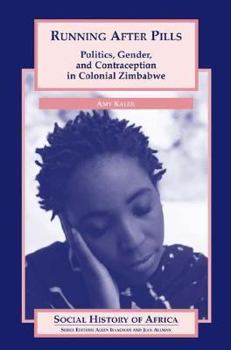Running After Pills
Select Format
Select Condition 
Book Overview
Kaler examines how "modern" contraceptive technologies, such as the pill and the Deop-Provera injection, were embroiled in gender and generation conflicts, and in the national liberation struggle, in Zimbabwe during the 1960s and 1970s. Based on extensive oral and archival research, the book shows the ways in which fertility and control over reproduction within marriage and the family influenced the development of the "imagined community" of the...
Format:Paperback
Language:English
ISBN:0325070431
ISBN13:9780325070438
Release Date:December 2003
Publisher:Heinemann Educational Books
Length:264 Pages
Weight:0.95 lbs.
Dimensions:0.4" x 6.1" x 9.3"
Customer Reviews
2 ratings
Rich with data; somewhat skewed
Published by Thriftbooks.com User , 15 years ago
Running After Pills: Politics, Gender, and Contraception in Colonial Zimbabwe written by Amy Kaler is a very good read that gives an good snapshot of family planning during white majority rule in Zimbabwe from the mid 50's to the early 80's. Kaler uses interviews and verbatim text to present different sides to a very complicated issue. The majority of the material in the book comes from archival materials (e.g. speech transcripts, newspaper articles) and from qualitative interviews with family planning workers and "common" people that had experience with family planning during the time period. In my opinion the interviews are the strongest portions of the book, although she did have a tendency to be a bit redundant in her attempt to provide the reader with substantial proof that the interviewees were expressing concerns felt by a wide range of people. Using direct quotes from her subjects allowed the participants to have their voices very clearly heard throughout the book. I found the most intriguing idea from the book is the idea that women's bodies became a hot spot of political and social discussion. Kaler does a good job in explaining the many groups that had some claim of interest or authority over a woman's decision of what to do with her body. The introduction starts out strongly presenting a clear case about how fertility control is much more than whether or not a woman has a baby, and the many layers of interest that are affected by a single decision. She develops a very articulate argument during the discussion on Shona marriages (Chapter 5) the many competing factions and factors that helped to reinforce the idea that women were not and should not be the only ones in control of the decision of whether or not to use contraceptives. This discussion also emphasizes the second most interesting point in the book, that of presenting black Zimbabwean women against the typical view of a weak, uneducated African woman with little to no power. Indeed Kaler provides a strong case that black Zimbabwean women were actively engaged in finding ways to subvert all of the forces that were trying to exert control over their bodies and engaging in family planning without others' knowledge. Her interviews show the many ways and rationale that women were able to move past the limits that their place in society seemingly cast them. This is a powerful point as it presents a contradictory case against the majority discourse that likes to cast African women as weak and helpless women that need to be saved by outside forces. Lastly one of the other most fascinating points in the book is the discussion around indigenous beliefs around biomedicine and physical biology of humans. This portion of the book imparts insightful knowledge that can be very important to researchers from all fields in understanding the ways that Western concepts are seen in other cultures. Often biology is not the only or most important factor, but the additional layer of social conte
Family planning with a racist tinge
Published by Thriftbooks.com User , 20 years ago
Modern contraception is normally associated with an increase in women's freedom. Sexually, it put women on a par with men. But in Rhodesia, before majority rule in 1980, contraception triggered quite a different response amonst some of the Africans. Contraception, and indeed the entire rubric of family planning "was mass murder and genocide, a demographic attack on the African population", in one common view.Talk about cognitive dissonance! How could something generally looked upon favourably elsewhere take on this meaning? In much of her book, Kaler explains. The minority white government employed family planning workers, to separately serve whites and blacks. The workers themselves sincerely tried to help their clientele. But in the government, there was a vocal element urging family planning to be applied to blacks, to reduce their fertility vis-a-vis the whites. Needless to say, such urgings leaked out to the blacks, and were in turn used by revolutionaries as agitprop against Ian Smith's regime.






